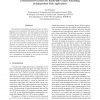Free Online Productivity Tools
i2Speak
i2Symbol
i2OCR
iTex2Img
iWeb2Print
iWeb2Shot
i2Type
iPdf2Split
iPdf2Merge
i2Bopomofo
i2Arabic
i2Style
i2Image
i2PDF
iLatex2Rtf
Sci2ools
IPPS
2005
IEEE
2005
IEEE
A Distributed Procedure for Bandwidth-Centric Scheduling of Independent-Task Applications
The problem of scheduling independent tasks on heterogeneous trees is considered. The nodes of the tree may have different processing times, and links different communication times. The single-port, full overlap model is used for modeling the activities of the nodes. A distributed method for determining the maximum steady-state throughput of a tree is presented. Then, we show how each node can build up its own local schedule independently of the rest of the platform. In addition, the final schedule is asynchronous and event-driven, meaning that each node (except the root) acts without any time-related information. A local scheduling strategy which aims at minimizing the amount of tasks buffered at node locations during steady-state is introduced. As a consequence, the lengths of the start-up and winddown phases are considerably reduced.
Distributed And Parallel Computing | IPPS 2005 | Local Scheduling Strategy | Maximum Steady-state Throughput | Node |
Related Content
| Added | 25 Jun 2010 |
| Updated | 25 Jun 2010 |
| Type | Conference |
| Year | 2005 |
| Where | IPPS |
| Authors | Cyril Banino |
Comments (0)

